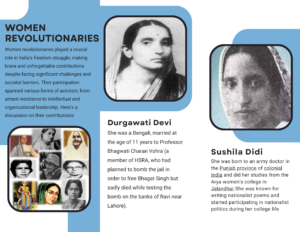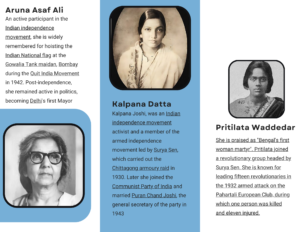Brave and enduring contributions were made by female revolutionaries to India’s war for independence. Talk about it. (Answer in 150 words)
Resources & Suggestions
Mains Answer Writing Latest Articles
Daily Answer Writing Practice Questions (18 April 2025)
Do you agree with the claim that indecision and risk aversion are prevalent issues in Indian bureaucracy? Support your answer with logical reasoning. (150 words) ऐसा कहा जाता है कि भारतीय नौकरशाही में अनिर्णय और जोखिम से बचने की प्रवृत्ति ...
Strengthening India’s Cyber Defence
Rising Threats Digital Era Challenges: 2024 marks a significant rise in digital threats, particularly from AI and cyberattacks. Key Issues: Disinformation campaigns. Cyber fraud affecting daily life. Current Major Cyber Threats Ransomware Rampage: Over 48,000 instances of WannaCry ransomware detected ...
भारत की साइबर सुरक्षा
बढ़ते खतरे कृत्रिम बुद्धिमत्ता (AI) और साइबर हमले: 2024 में AI और साइबर हमलों के खतरे में वृद्धि। महत्वपूर्ण अवसंरचना पर हमले: डिजिटल हमलों और दुष्प्रचार अभियानों की संभावना बढ़ी है। प्रमुख साइबर खतरें रैनसमवेयर का प्रकोप: 48,000 से अधिक ...

The history of the Indian freedom struggle would be incomplete without mentioning the contributions of women. They fought with true spirit and undaunted courage and faced various tortures, exploitation and hardships to earn us freedom. They also took charge of the freedom struggle at many instances when male freedom fighters were in prison.
The women revolutionaries and their contributions include:
Women revolutionaries made unforgettable contributions to the growth of militant nationalism in India. Apart from their role in revolutionary activities, women also called upon their countrymen and upon the British government the urgent need for social, economic, legal and political reforms to improve the lives of women in the sub-continent.
Certainly! Women played a crucial and often overlooked role in India’s freedom struggle, making brave and unforgettable contributions that helped shape the course of history. Despite societal constraints and gender biases of the time, many women revolutionaries emerged as prominent figures, actively participating in various forms of resistance against British colonial rule.
One notable figure is Bhikaji Cama, who is remembered for her role in the Indian independence movement and for being one of the first to hoist the Indian flag on foreign soil in Stuttgart, Germany in 1907. Sarojini Naidu is also remembered for her speeches and efforts

Among the key actors who brought the Indian national freedom movement to the finishing line were the women, who were fearless and committed and defiantly changed the course of events. Brave ones like Rani Lakshmibai of Jhansi were able to stand up to the brutal British forces during the 1857 rebellion and became an example of courage and resistance.
Otherwise known as the “Nightingale of India,” Sarojini Naidu was one of the important figures of the civil disobedience movement, and her voice was often used for the rights of women. Aruna Asaf Ali, who gained attention during the Quit India Movement in 1942, led demonstrations and flew the Indian National Congress flag at the Gowalia Tank Maidan in Bombay.
Bhikaji Cama, an early sponsor of independence, unfolded the first edition of the Indian flag at the international socialist convention in Germany in 1907, thus acquiring the support of the international community for the Indian cause. Apart from these women and many others, they not only stood up against British colonial control but also they were the ones who dismantled societal traditions, this way, igniting the desire for freedom and gender equality in the vanguard years.
Among the key actors who brought the Indian national freedom movement to the finishing line were the women, who were fearless and committed and defiantly changed the course of events. Brave ones like Rani Lakshmibai of Jhansi were able to stand up to the brutal British forces during the 1857 rebellion and became an example of courage and resistance.
Otherwise known as the “Nightingale of India,” Sarojini Naidu was one of the important figures of the civil disobedience movement, and her voice was often used for the rights of women. Aruna Asaf Ali, who gained attention during the Quit India Movement in 1942, led demonstrations and flew the Indian National Congress flag at the Gowalia Tank Maidan in Bombay.
Bhikaji Cama, an early sponsor of independence, unfolded the first edition of the Indian flag at the international socialist convention in Germany in 1907, thus acquiring the support of the international community for the Indian cause. Apart from these women and many others, they not only stood up against British colonial control but also they were the ones who dismantled societal traditions, this way, igniting the desire for freedom and gender equality in the vanguard years.